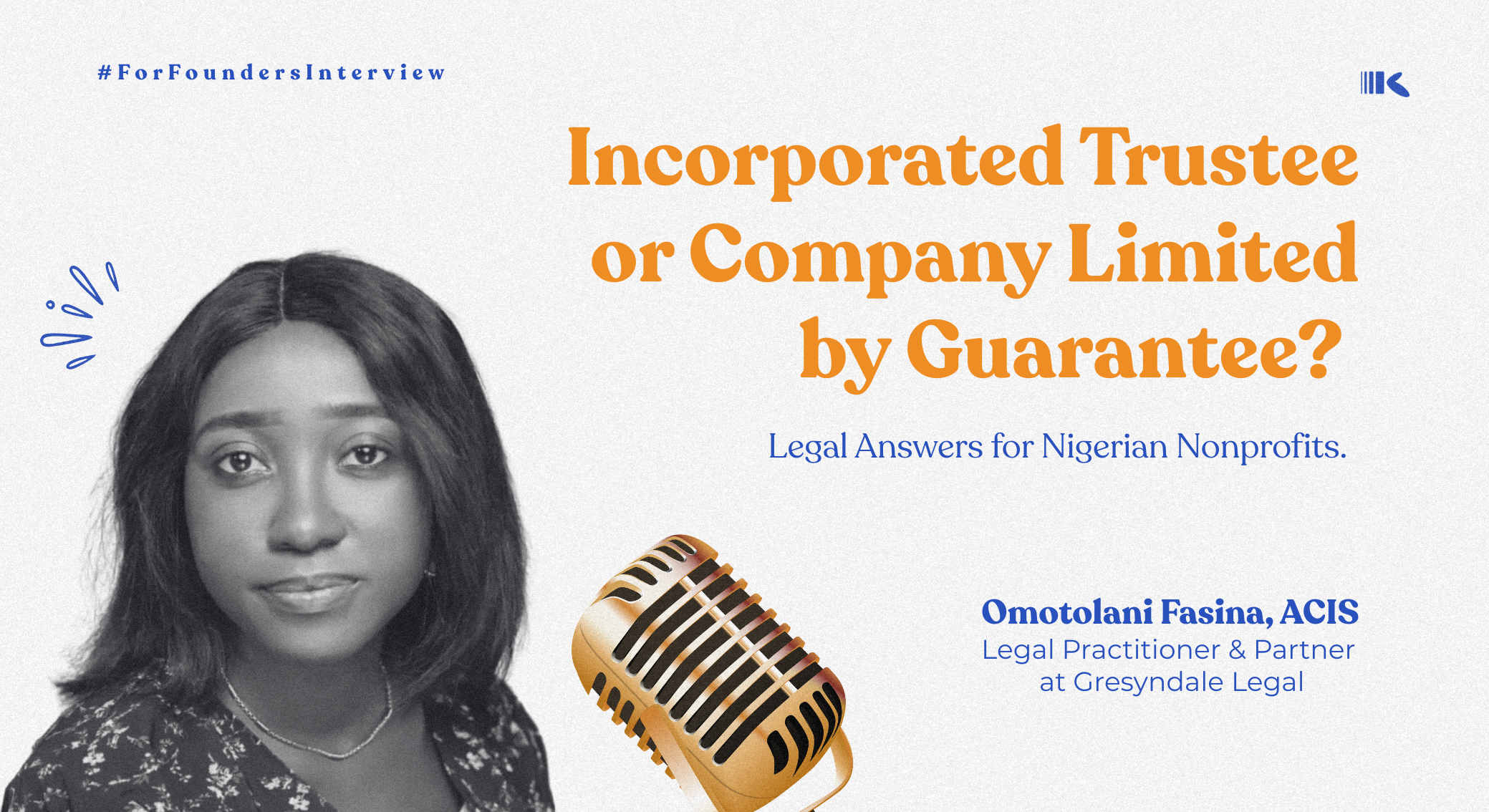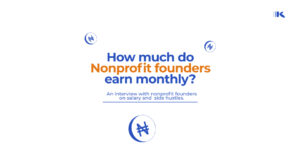In our earlier piece on Types of nonprofit in Nigeria, we explained that there is more than one way to register under the Companies and Allied Matters Act (CAMA) 2020. We also highlighted, in our tips for positioning your nonprofit for funding, that the registration status and how you structure your organization can shape the kind of funding opportunities available to you. If we could add one more takeaway, it would be a valuable piece of legal advice we first shared during the Dear NGO Founder series.
Welcome to this edition of our For Founder Interview, as part of our mission to democratise valuable information for nonprofit founders, especially those who may not have easy access to legal services, we are launching the #ForFoundersInterview series here at Kryvent. This interview continues the work we began at DNF ( Dear NGO Founder) by addressing critical questions that come up before and after registration, helping you move with clarity and confidence.
In this Interview, Pelumi engages with professionals and ecosystem stakeholders to offer answers to pressing questions and insights you didn’t know you needed. Today, I’m virtually sitting with Mrs. Omotolani Fasina. She is a legal practitioner with over a decade of experience in corporate and commercial law. She currently serves as a partner at Gresyndale Legal, a leading legal advisory firm in Africa.
Pelumi: Hello Ma, thank you for granting this interview and welcome to Kryvent’s #Forfoundersinterview.
Mrs. Omotolani Fasina: Thank you for having me, Pelumi. It’s my pleasure to help.
Pelumi: As a nonprofit founder, how should one determine whether to register as an Incorporated Trustee or a Company Limited by Guarantee? What factors should guide that decision?
Mrs Omotolani Fasina: The determination of which one to register depends on how the whole idea started. So just like the name implies, incorporated trustees is a sort of trust relationship. It contemplates that there is a community of people with a common affinity or an association of people with a common interest and to pursue that interest, they appoint two or more people as trustees. These trustees can sue and be sued, and they would be responsible for the acts and omissions of the association. On the other hand, a company Limited by Guarantee contemplates a situation where two or more people who have a common interest decide to set up an organisation to achieve those interest, and then guarantee a certain sum of money such that when the company is being wound up, they are only liable for the debts of the company to the extent of the amount they guaranteed.
In other words, the decision to form an incorporated Trustee is the decision of an association of people while the decision to register a company limited by guarantee may be the decision of just a few persons. So this is the number one factor. Also, where the organisation is being set up for commerce or research, it should be a company limited by guarantee.
Another factor to consider is the level of government scrutiny. An incorporated trustee is subject to government scrutiny and in fact, the commission could in certain cases, e.g. if it is found that monies are being misappropriated, appoint interim managers.
In addition, a company limited by guarantee can actually carry on business activities for the purpose of making profit, just that the profit cannot be distributed and must be applied to its objective. An incorporated trustee on the other hand is limited in its ability to do business.
Pelumi:. Are there legal implications regarding who is selected as a trustee, or can founders appoint just anyone?
Mrs Omotolani Fasina: Anyone can be appointed as a trustee provided that he or she is not an infant, a person of unsound mind having been so found by a court, an undischarged bankrupt or has been convicted of an offence involving fraud or dishonesty within five years of his proposed appointment.
Pelumi: When it comes to fundraising activities, what are the limitations or requirements for each registration type — Incorporated Trustees and Company Limited by Guarantee?
Mrs Omotolani Fasina: There are no limitations in law to fund raising. It could come by way of donations, levies from members, grants, etc. but with Company Limited by Guarantee, you can also do business for profit and the profit will form part of the funds for the achievements of the objectives.
Pelumi: Can a nonprofit be converted into a company or social enterprise under Nigerian law? If so, what does that process typically involve?
Mrs Omotolani Fasina: An Incorporated Trustee cannot be converted into a company. A company limited by guarantee is already a company, so that question doesn’t really come up. Social enterprises would typically be registered as a company limited by guarantee. If you want to change from one form to another, you just have to register afresh
Pelumi: What are your thoughts on Special Purpose Vehicle (SPV), and in what ways can it be useful for a nonprofit organization?
Mrs Omotolani Fasina: An SPV is a company whether private or public set up for a specific purpose and when that purpose has been achieved, the SPV would come to an end. It can be used by the not-for-profit to raise money, or to carry out a specific project that could result in huge liabilities.
Pelumi: Are social clubs or giving clubs eligible for registration under the nonprofit legal framework in Nigeria?
Mrs Omotolani Fasina: Provided the goal of the club is not to share income derived amongst its members, it could register as an Incorporated Trustee.
Pelumi: Name rejection appears to be a common challenge at the Corporate Affairs Commission. What practical tips would you give a founder to avoid this when choosing a name before registration?
Mrs Omotolani Fasina: First there are some names or words used in the name that are clearly prohibited or restricted. You need to avoid prohibited names and you need to seek requisite consent for restricted names.
In addition, be creative with the development of your name and if you are using something common, make it unique by adding two or more words to the name.
N.B The restricted names and the ones needing consent are public information, to avoid problems we recommend that you conduct your research. In addition, you can digitally search through CAC’s portal for existing/taken names. If possible, reserve your name before branding and social media efforts.
Pelumi: Companies Limited by Guarantee are a less popular option, are there any peculiar challenges in setting one up?
Mrs Omotolani Fasina: You require the consent of the Attorney-General of the Federation. This could be a daunting process, though the Companies and Allied Matters Act (CAMA), 2020 seems to have simplified the process.
Pelumi: In the coming years, what would you love to see differently in our registration regime or laws pertaining to nonprofit organizations?
Mrs Omotolani Fasina: I believe that the process can still be simplified. With the number of days one has to wait for one newspaper publication to the next activity, registering an incorporated trustee could take almost 3 months. Similarly with the consent requirement for Company Limited by Guarantee, it could even be much longer. This could be discouraging and needs to be reworked.
With this, we’ve come to the end of our conversation with the legal practitioner. Up next is our founder vox pop, where nonprofit leaders share their real-life experiences and challenges with registration. If you have any specific legal concerns, we encourage you to consult a qualified lawyer. You can reach out to Gresyndale Legal on social media or via email at legal@gresyndale.com



[…] but it highlights an important lesson: not all nonprofits are prohibited from generating income. Clarity in registration and communication is essential when pursuing social enterprise models. Maybe You Should Build A […]